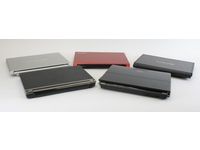Roundup: Five Ultra-light, Sexy Netbooks
Notebooks are becoming increasingly more attractive for mainstream consumers, and not just business people either. Nowadays, those who desire gaming capabilities have options that just a few short years ago, were just pipe dreams.
Check out the Tom’s Guide ultraportable roundup
But what about those who just want a capable notebook that’s light, but doesn’t skimp on power? Maybe you don’t want to play cutting edge games, but you need strong battery life, the ability to run several productivity applications, and do the occasional movie watching. Unfortunately, most consumers shy away from notebook that are 15-inches and larger due to weight (unless you’re a serious mobile gamer), and up until now, smaller netbooks have been underpowered and underwhelming.
But this week, there are at least five netbooks out on the market that provide essentially everything you need in a road-warrior notebook but in netbook form.
Our sister mainstream consumer publication Tom’s Guide, takes an in-depth look at several different highly capable netbooks. They take a look at the Asus U2E, the Fujitsu P8010, the Lenovo IdeaPad U110, the Toshiba R500 and the high end Sony Vaio TZ.
Prices range from $1699 to a whopping $3000 for the Sony Viao — of course, Sony’s products always have a high premium on them due to design — and as you’ll see, choice of components matter too.
I had the chance to pay around with each of the notebooks myself, and from what I can tell, the Sony TZ is definitely the best of the bunch in terms of overall experience. It actually comes equipped with a 64GB SSD drive and a 240 GB regular HDD for added storage. The LCD on the Sony is the brightest and sharpest of the bunch too.
Get Tom's Hardware's best news and in-depth reviews, straight to your inbox.
One caveat of these netbooks is that all their screens are very flexible. This means that if you’re note careful, you’re going to have a broken display. The screens flex easily but they are extremely thin. The netbook that had the flimsiest screen was the Fujitsu. In terms of styling, the Lenovo IdeaPad and the Sony TZ were the best of the bunch, with points going to Lenovo for introducing a very interesting exterior design while having the best feeling of durability out of the five.
Are netbooks more attractive to mobile users than full blown notebooks? Clearly this depends on your intent, but there’s definitely something about carrying around a very light computing device. If you travel a lot, go to a lot of trade shows, or just have a bad back — netbooks are right up your alley. Take a look at the full roundup over at Tom’s Guide.
Just a word of note, Sony recalled its Vaio TZ line and have outright discontinued the product in favor of an updated unit called the TT. Unfortunately, the new TT is thicker and heavier than the carbon-fiber TZ.
-
michaelahess These aren't netbooks, they are ultra portables, why does the title say netbook? From the wiki:Reply
The term netbook refers to a category of small to medium sized, light-weight, low-cost, energy-efficient, Internet-centric laptops, generally optimized for Web surfing and e-mailing
'fraid none of the reviewed LAPTOPS (however small) fall under this category. -
radguy Totally agree with michael. The term netbook is missused completely in this article. Like he said ultra portable notebooks are NOT netbooksReply -
gxsolace radguyTotally agree with michael. The term netbook is missused completely in this article. Like he said ultra portable notebooks are NOT netbooksReply
Really? How come the Asus EeePC appears in both Wiki's pages for netbooks and ultraportables?
I thought you said ultra portable notebooks are "NOT" netbooks?
Strange indeed! ...
http://en.wikipedia.org/wiki/Ultra-Mobile_PC -- Read section 2008
http://en.wikipedia.org/wiki/Netbook
http://en.wikipedia.org/wiki/Subnotebook
Also notice that there is a tag on Wikipedia that says UMPCs should be merged with the Netbooks section? And that in the parent UMPC article it says:
"In personal computers, Ultra-Mobile PC (often abbreviated UMPC) is a small form factor (a standard size and shape) for tablet PCs and subnotebook/netbooks. "
Yeah? No? Hmm.
And at he top of that page it says:
"
This article or section has multiple issues. Please help improve the article or discuss these issues on the talk page.
* It needs additional references or sources for verification. Tagged since June 2008.
"
So if Wiki says a cow is a duck, you'll believe right? -
randomizer gxsolaceSo if Wiki says a cow is a duck, you'll believe right?I'd do a PhD thesis based on Wiki information just because it's Wiki.Reply -
You should also pay attention to the formal side of the text:Reply
• ‘Sony Viao’... should be ‘Sony Vaio‘ ’?
• ‘chance to pay around’... should be ‘chance to play around’?
• ‘64GB’ and ‘240 GB’... with space or without space?
-
michaelahess Look, the general public already has netbook in their minds as a dirt cheap device for email and web. Calling these ultraportables netbooks it the same as calling a BMW 7 series a Chevy Aveo!Reply
I could care less what all the various articles on the net say, I do believe the wiki is correct, but it's all based on consumer conception. This article goes against that in every way. -
I totally agree with michael.Reply
None of the books mentioned are in a class where they are 'affordable for the consumer'.
As far as Asus EeePc, they have models going for 175 streetprice (EeePc 2G/4G series), and have models nearing $1000 (EeePc 1000 series).
In my eyes, any notebook above $500 can no longer be called 'affordable', since any poor guy who needs a device to connect to the internet and preferably do little more than just check his internet mail, probably will go for a laptop. Seeing laptops with 3 times the RAW power go for the same price.
Mininotebooks are more the Intel Atom based devices (which I think still cost 100 to 200 $ too much!), the small Celeron M based devices like Asus EeePc series,as well as older architectures that stay below the 500 range. -
radguy dude gxsloaceReply
First off I didn't reference wiki michael did. I did say I agree with him on the use of the term netbook. I have been looking at netbooks for a good while cause my current laptop weighs like 8lbs. No where I have I seen that these types of notebooks are called netbooks. If you click on pc/laptops on newegg and click on netbooks none of these devices pop up for a reason they don't fit into the current definition on a netbook.
I did say ultra portable notebooks aren't netbooks.
You said Wiki says ultra mobile pcs should be merged with netbooks. I don't disagree with that. I didn't use the term ultra mobile pc. But I don't consider these items to be ultra mobile pcs either.
I should also state that this is just my opinion of what current terminology of these different devices should be called, but do you really think that particular computers should be called netbooks?
Also I take everything wiki says with a grain of salt just to let you know. -
A netbook is designed differently than a traditional notebook. A netbook is supposed to primarily serve pages from a network or the internet. Netbooks do not do most of the processing they are client machines not notebook/desktop replacements. Thus, less processing power is required leading to a less expensive machine. All of the machines in the article are meant to do their own processing, and therefore are not netbooks.Reply

